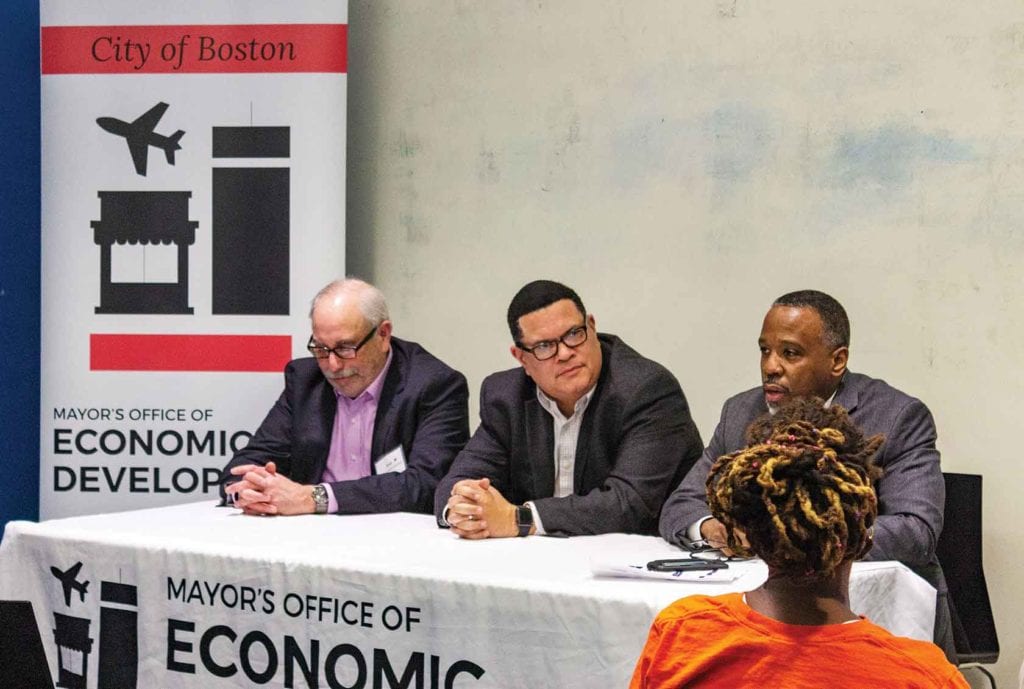Advancing with partners
Pathways to City Contracting panel promotes joint ventures

In the second installment of the Mayor’s Office of Economic Development’s Pathways to City Contracting workshop series last week, local business owners learned about creating joint ventures to better leverage their skills.
Attorney Joel Sowalsky of Daily General Council, PLLC explained to the group, which included almost 40 local real estate brokers, consultants, construction managers and other professionals, many hoping to win a contract with the city, that joint ventures are a great way for more than one business to collaborate on a project.
“Joint ventures are nice in the way that you’re going to be working cooperatively,” Sowalsky said. “The contracting game is all about relationships.”
The Wednesday evening seminar was part of a free six-week Diversity and Inclusion series hosted by the city’s Economic Development Center, launched by Mayor Martin Walsh last month. Participants who complete the full series will receive an invitation to be matched with a city department for a contracting opportunity.
Sowalsky told the attendees that joint ventures are one way they can improve their resume before looking for a city contract, as working with more experienced companies can help win bigger projects. Smaller firms and start-ups often lack the expertise to bid on large contracts. More importantly, they lack the bonding capacity required by insurance companies to take on larger projects. Joint ventures can help smaller firms scale up their capacity.
In addition, working with other companies gives small businesses the opportunity to learn and build their skills, as well as form relationships with people in and outside of their trade.
“It enhances your prospects as a contractor even after the joint venture, to be able to say, this is a big project that I did,” Sowalsky explained. “It’ll enhance your growth as a contractor.”
Minority-owned firms
The attendees, many of whom represented minority- or women-owned businesses, are also at an advantage when they’re looking to work with the city, Sowalsky said, because they can leverage their standing as minority-owned firms to help projects fill diversity requirements.
“That’s something you can leverage in your joint venture to increase your ownership,” he said.
The workshop also covered things that business owners should watch out for when they want to enter a joint venture. Sowalsky went through what a joint venture agreement should include, such as dividing up responsibilities between partners, and reminded everyone to be prepared (and insured) for the worst.
While no business owner wants to consider the possibility of a partner in the venture going bankrupt, or being sued years down the line for work that was done by an irresponsible partner in the project, these are very real issues that need to be prepared for.
“Just because the project ends and you leave the joint venture project doesn’t mean someone isn’t going to sue you in a year or two years or three years,” Sowalsky said. “Things can happen when the job is done, and you want to provide for the continuation of your obligations to one another.”
Sowalsky said that the number one rule for creating a joint venture, though, is to choose your partner very carefully, because having all partners agree is vital for the life of the partnership.
“If you’re dealing with good people, you’ll figure it all out eventually,” Sowalsky said. “But if you’re not dealing with a person of good character or a company of good character, no contract can be long enough or tight enough to protect you.”



![Banner [Virtual] Art Gallery](https://baystatebanner.com/wp-content/uploads/2024/04/Cagen-Luse_Men-at-store-e1713991226112-150x150.jpg)



